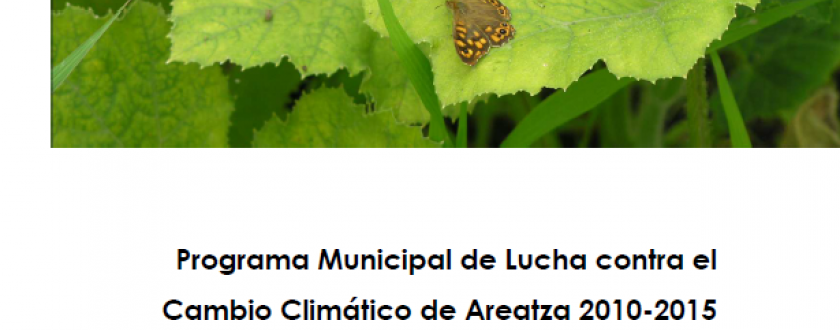Municipal Climate Change Programme in Areatza 2010-2015
Description of the case study
Local entities play a crucial role in mitigating the effects of climate change and have direct responsibility for climate change adaptation. For several years the Basque municipality of Areatza has been working towards a local climate change strategy to reverse the upward trend in GHG emissions and prepare for climate change impacts. This is a clear example of how the rural environment has a key role in defining new regional models which are resilient and environmentally-friendly.
Areatza, working jointly with other municipalities in the Basque Network of Municipalities for Sustainability (Udalsarea 21), has been developing an analysis and diagnostics of the effects of climate change on various sectors at municipal level.
Work to develop a climate change programme in Areatza has taken a regional and socio-economic approach. The initiative aims to tackle increases in local GHG emissions (more than 17% between 2010 and 2015 with respect to 2006, according to forecasts) and specifically to reduce these by more than 7% during the programme’s lifetime.
As well as mitigation measures, the climate change strategy includes adaptation measures for various socio-economic sectors at the local scale.
The main objectives of the initiative are as follows:
- Guarantee sustainable urban development which is adapted to regional and global climate change.
- Promote more sustainable forms of mobility which favour a reduction in GHG emissions.
- Make the region more resilient by preserving its natural heritage, its landscape value and the biodiversity found there.
- Optimise the use and consumption of municipal natural resources: water, land and effective waste management.
- Improve energy efficiency in the local area.
- Raise local awareness around climate change adaptation and mitigation and encourage active citizen participation in defining the programme and its implementation.
The municipal programme has taken forward measures to tackle climate change, among which are the following adaptation actions:
- Increasing the diversity of forest species in municipal uncultivated public land areas.
- Reforesting municipal land with native species.
- Use of native species in green areas and gardens. Monitoring and control of invasive species.
- Inventory of municipal carbon sinks: assessment of the carbon retained and land use changes.
- Improving water sanitation and storage infrastructure to optimise water use and monitoring of water consumption and thus manage this resource more effectively.
- Public awareness campaigns.
- Preparation of a Municipal Emergency Plan which includes climate contingency protocols.
- Development of a Sustainable Mobility Plan.
- Development of a Sustainable Energy Action Plan.
Case mainly developed and implemented via objectives from other non-adaptation policies, though with significant consideration for climate change adaptation aspects.
Areatza Town Hall, Basque Network of Municipalities for Sustainability (Udalsarea 21)
Additional Information
Preparation of the programme and its implementation have involved citizen participation processes built upon the participative structures already set up during the creation of the area’s Local Action Plan (2012).
Not included.
This programme has been developed as part of the AUZOLAN 21 Programme launched by the Basque Network of Municipalities for Sustainability (Udalsarea 21) to establish shared guidelines for developing local climate change strategies in Basque municipalities. Similar programmes have been developed in a further five municipalities: Amurrio, Balmaseda, Durango, Legazpi and Tolosa.
2010 -2015 (5 years - complete, currently being updated)
Reference information
PYRENEAN CLIMATE CHANGE OBSERVATORY
Avenida Nuestra Señora de la Victoria, 8
22.700 - Jaca
Huesca - España
+34 974 36 31 00
info_opcc@ctp.org





